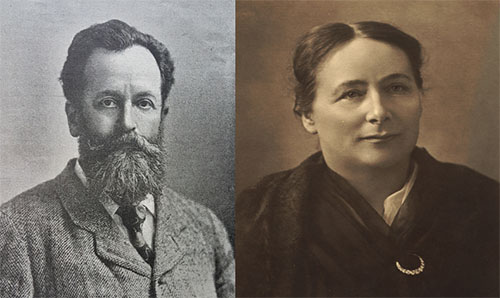Celebrating the Simons of Manchester: The lives and public work of the influential family of progressive social reformers (1860 – 1972)
John Ayshford (PhD History Researcher, The University of Manchester), Martin Dodge (Senior Lecturer in Geography, The University of Manchester), Stuart Jones (Professor of Intellectual History, The University of Manchester).

Our project seeks to document, interrogate and celebrate the lives and public work of the Simon family; Henry and Emily Simon, and Ernest and Shena Simon. The two generations of the Simons actively engaged in philanthropy and social reform on a civic and national level, helping to improve the city of Manchester and instigate major national reforms in education, housing and planning.
Henry Simon (1835-1899) was a German émigré who arrived in Manchester in 1860. A pioneering industrialist, he established a business empire from revolutionising the milling of flour and the production of coke. In 1878 he married Emily Simon, née Stoehr (1858-1920). A passionate advocate for girls’ education, Emily also became one of the first recipients of an O.B.E. for her work running the Simon family home as a hostel for Belgian refugees and as a Red Cross hospital during the First World War. Henry and Emily were leading philanthropists helping to improve the conditions of working people in Manchester and to enrich the city’s educational and cultural institutions.
Their son Ernest Simon (1879-1960) and his wife Shena Simon, née Potter (1883-1972), who became Lord and Lady Simon of Wythenshawe, were two of Britain’s greatest social reformers of the twentieth century. Ernest Simon was a prominent figure in twentieth century British politics and one of the nation’s foremost voices on public housing reform and town-planning. A prolific author and campaigner, Ernest worked on a plethora of causes ranging from smoke pollution, democracy and citizenship, to higher education. Ernest served as BBC Chairman alongside helping to found The New Statesman magazine and the Campaign for Nuclear Disarmament. Shena Simon was an equally devoted public servant as well as a renowned progressive educationist. Serving on the Manchester City Council’s education committee for over forty years, her work as an educational reformer paved the way for the introduction of universal secondary education and comprehensive schools. A champion of women’s rights, Shena began her public career examining the working conditions of poor women labourers. Alongside Ernest she was dedicated to abolishing the terrible housing conditions in inner city Manchester and played an instrumental role in the development of Manchester’s garden city, Wythenshawe. She was a notable social investigator and established herself as a distinguished authority on civic government and international educational systems.
Little historical attention, however, has been paid to the Simons and they have all but been forgotten; many people in Manchester are completely unaware of who they were or what they achieved. To therefore rehabilitate their legacies, our project, supported by the John Rylands Research Institute and the UoM Simon Fund, will produce an accessible edited book by a number of leading scholars of the Simons to bring together for the first time a comprehensive account of their public service and private lives. Alongside commemorating their achievements, the project’s chief aim in exploring the public work of the Simons is underpinned by its relevance to the social and economic landscape of Britain and Greater Manchester today. Many of the social issues that the Simons passionately campaigned on during their time sadly remain pressing today. The project will also make extensive use of various archives relating to the Simons that are held in special collections of The University of Manchester Library.
Current projects
Our research work is improving our understanding of people, cultures and societies around the world.
Read more
Past projects
An overview of completed projects from the John Rylands Research Institute and Library dating from 2017.
Read more
